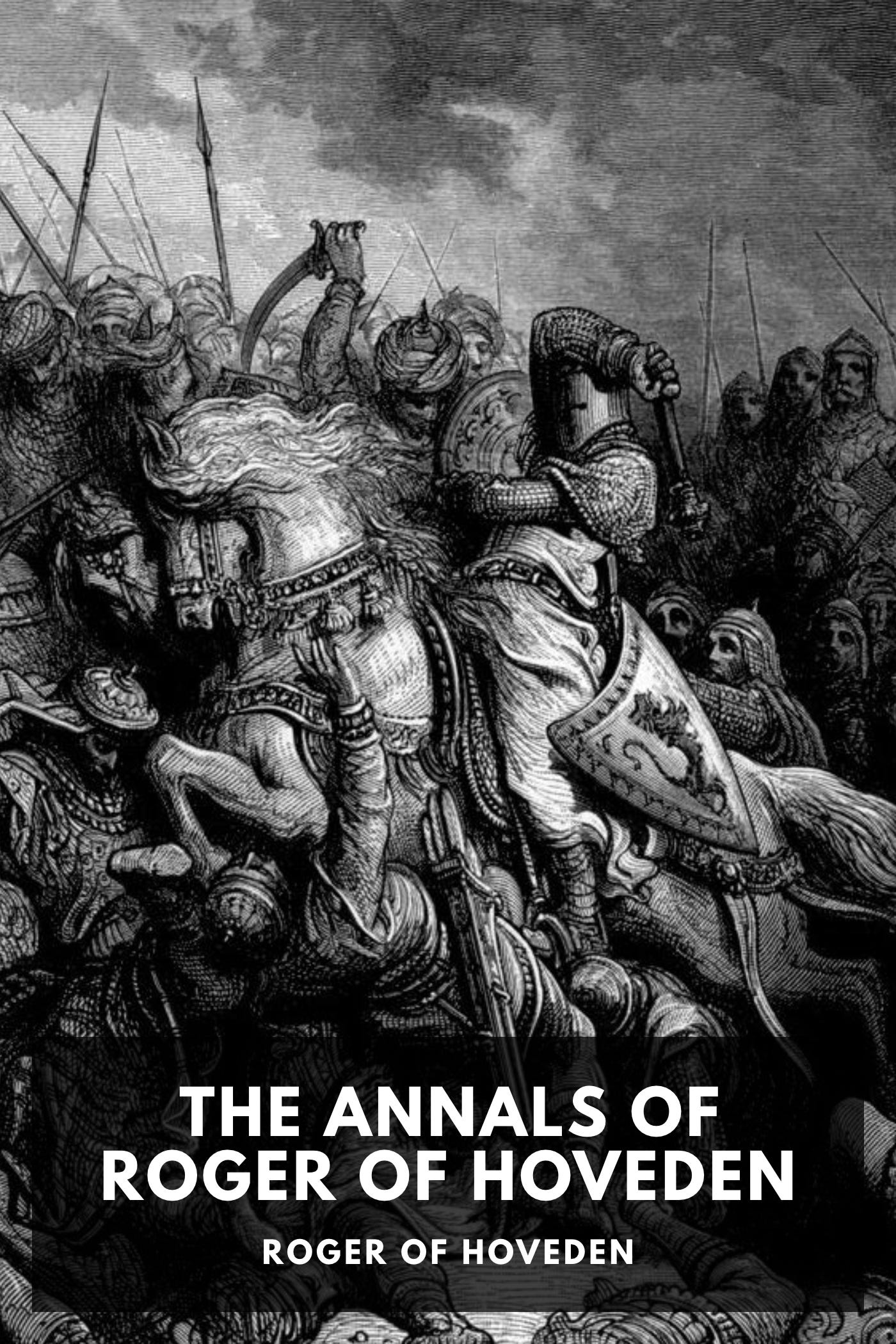Why, what art thou, thou bold fellow,
That ranges so boldly here?
In sooth, to be brief, thou lookst like a thief,
That comes to steal our king's deer.
For I am a keeper in this forrest;
The king puts me in trust
To look to his deer, that range here and there,
Therefore stay thee I must.1
So, I’ve been reading one of the contemporary histories of Richard’s time, The Annals of Roger of Hoveden, written around 1201. In fact, you can buy our edition of Roger on Amazon. Very nicely formatted with beautiful typography if we do say so ourselves. Better than trying to read sketchy Internet Archive scanned pages…..but I digress.
In Roger, I found this, regarding Eleanor of Aquitaine pardoning Robin Hood. OK, I made up the part about Robin Hood, but still:
In the meantime, queen Eleanor, the mother of the before named duke, moved her royal court from city to city, and from castle to castle, just as she thought proper; and sending messengers throughout all the counties of England, ordered that all captives should be liberated from prison and confinement, for the good of the soul of Henry, her lord; inasmuch as, in her own person, she had learnt by experience that confinement is distasteful to mankind, and that it is a most delightful refreshment to the spirits to be liberated therefrom. She, moreover, gave directions, in obedience to the orders of her son, the duke, that all who had been taken in custody for forestal should be acquitted thereof and released, and that all persons who had been outlawed for forestal offences should return in peace, acquitted of all previous offences against the forest laws; and further, that all persons who had been taken and detained by the will of the king, or of his justice, and who had not been detained according to the common law of the county or hundred, or on appeal, should be acquitted; and that those who were detained by the common law…
OK cool, but what the heck is forestal?
Turns out it is the adjectival form of forest; that is, forestal means ‘pertaining to forests’. Roger has used a bit of shorthand here, for what he means when he says ‘taken in custody for forestal’ is ‘taken into custody for violating the king’s laws pertaining to his forests’.
Let’s unpack this a bit, maybe Robin Hood is lurking in here somewhere.
As you may recall, William the Conqueror, a Norman, conquered England in 1066. Fascinating story: completely coincidentally and unknown to each other, King Harald Hardrada (the so-called “Last Viking”), and William the Conqueror both attacked King Harold of England within days of each other from different directions. Harold killed Harald at the Battle of Stamford Bridge, then raced south to do battle with William, this time losing. But again I digress.
William was the first of the Norman kings of England, and the Norman kings began the practice of reserving vast tracts of land for the exclusive use in hunting, and later for revenue as well. While the original concept was around sport, later kings discovered the financial opportunity: In 1175 Henry II raised over £12,000 by this means alone – and that at a time when the total royal revenue audited by the English Exchequer rarely exceeded £20,000 a year.2
The word “forest” can be a bit misleading - the land in question might be forest per se, or it might be fields or meadows or entire villages or anything else. When you read “royal forest”, you should think something more like ‘king’s land’ or ‘game preserve’.
The amount of land that was a royal forest in this era is staggering. You might think it was just a forest or two, here and there. No.
By 1189, between one third and one quarter of England was considered by the king as within the bounds of the royal forest3.
As a reminder, 1189 is the year Richard the Lionheart became King Richard. The royal forests had considerable restriction on use and this was an enormous source of tension between the “English” and the “Normans”.
As a modern aside: while this is staggering, consider the case of modern day Utah, where I lived for a time: 71% of Utah (71%!!!!) consists of public land managed by federal or state agencies4, a source of considerable tension between different interest groups in the state.
To us, perhaps the most well-known feature of the forest laws was the prohibition against hunting the King’s deer, but in reality there was a wide range of prohibitions and penalties. Prohibitions existed on killing any beast, felling trees, clearing land, collecting fallen timber and berries, fencing property, and many other land-related activities. Dogs within a royal forest must have their fore-claws removed, so that they are unable to hunt or damage the royal deer (Roger of Hoveden mentions this detail). These were referred to as laws of venison and vert, venison meaning any beast of chase, not just deer, and vert, green, meaning land-related activities. Penalties might include fines (anywhere from a few shillings up to 100 pounds, an enormous sum then), as well as harsher penalties including imprisonment, blinding, castration …… and in some cases and in some eras, death. Death was usually reserved for taking the king’s deer. During Richard’s time the penalty for taking a deer was blinding and castration, although, as we have seen, Eleanor pardoned all such prisoners at Richard’s instigation, suggesting a weakening in how such crimes were perceived. The crimes and penalties varied over time, generally relaxing as time progressed.
Forest law was a major topic of conflict during King John’s era and one of the topics covered by Magna Carta, where John agreed to de-forest any new royal forests created during his reign (although I don’t believe this actually happened).
The royal forests were managed under a judicial system that was completely separate from common law and reported directly to the king. There was a separate forest court system. Each forest had a management system: the forest was patrolled by foresters or rangers, watching for violation. They reported to foresters-in-fee, who in turn reported to the warden, who had sole responsibility for the management of the ‘forest’.
The court system was a bit complicated. Every 40 days there would be a Court of Attachment (Woodmote), which tried minor cases and imposed minor fines, but could not convict an offender for larger offenses. Other crimes were deferred to the Swanmote, held three times per year, where offenders were tried and convicted, but not sentenced. In theory at least, sentencing was only passed during the Court of Justice-Seat (or eyre), held every three years. I am not entirely sure what happened to people convicted at Swanmote, between the Swanmote and the Eyre - various readings show “bail”, so perhaps similarly to today, an offender was held until the Eyre unless they posted bail.
In a most interesting detail, Roger of Hoveden himself was a justice of the forest!5
OK what about Sherwood Forest, forest law and Robin Hood?6
In 1194, after his liberation from captivity, King Richard in fact visited Sherwood Forest, according to our friend Roger of Hoveden:
On the twenty-ninth day of March, Richard, king of England, went to see Clipston and the forests of Sherwood, which he had never seen before, and they pleased him greatly..
Sherwood Forest (“shire-wood”) was indeed a Royal Forest in the shire of Nottinghamshire. And it had deer. And trees. And maybe Richard ran into a young fellow named Rob roaming around….we’ll never know.
https://archive.org/details/englishandscotti03chiluoft/page/138/mode/1up?q=126
https://erenow.net/postclassical/1215theyearofmagnacarta/8.php
https://earlyenglishlaws.ac.uk/reference/essays/forest-law/#fn:8
https://le.utah.gov/interim/2021/pdf/00004132.pdf
https://earlyenglishlaws.ac.uk/laws/texts/ass-wood/
http://www.mercian-as.co.uk/forest_law.html









Of course he ran into Rob! And I was reminded of the scene in Becket, where he confronts the young Saxon who's been out breaking the laws of "venison and vert". Eleanor's pardons are very interesting.. sounds like it would have affected quite a few people. Hmmm clearly some reading is in order! Thanks for the info, as always.
It was in the movie…not sure about the play or book…movie is excellent.